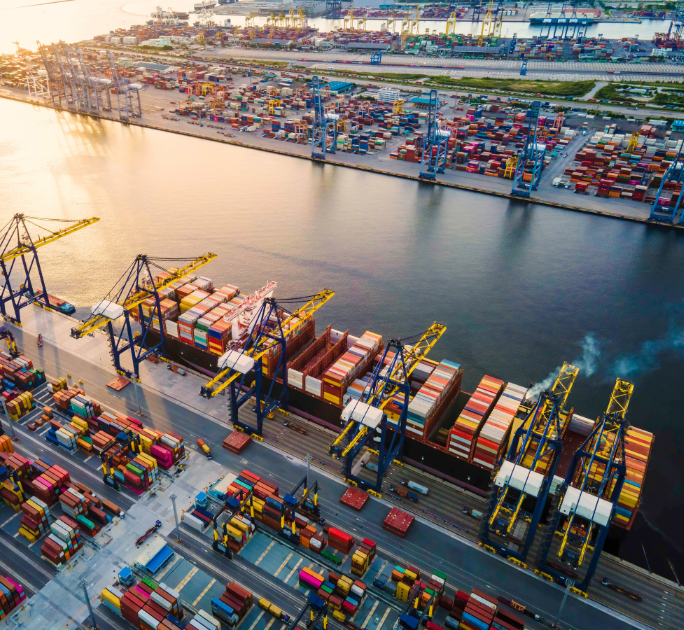Entering new markets: Banking on DBS to join the dots

One of the biggest trends impacting the global economy today is the ongoing uncertainty surrounding trade policy emanating from the world’s largest economies.
From US President Donald Trump’s on-again-off-again tariffs1 to the tactics by other governments to apply countermeasures in response,2 policy uncertainty—coupled with asset price volatility and question marks over the interest rate outlook—is stymying companies’ planning and investment decisions.
These factors—some cyclical and some policy-driven—have resulted in a volatile economic environment and subdued growth. According to the OECD, global economic growth is expected to slow down to 2.9% in 2025,3 meaning businesses will have to look for other means to support growth and profitability.
One avenue could be increased exposure to markets in Asia, which are still expected to see significantly stronger growth than counterparts elsewhere—the Asian Development Bank forecasts developing Asia to grow at 4.9% in 2025.4
Evolving trade landscape
The shifting tides of today’s trade landscape aren’t new, but rather reflect an ongoing process of realignment as rising labour costs in China and the onset of US-China trade tensions pushed companies to explore new ways to diversify their supply chains.
The “China +1” strategy has become increasingly popular, with companies looking to production sources in neighbouring regions, such as South Asia and Southeast Asia. In the early stages, Vietnam emerged as a major beneficiary of the global trade realignment but the situation has only become more complex in light of the 46% tariffs that could be imposed on its exports to the US. But Vietnam has recently concluded its second round of trade negotiations with the US, so there is a chance the tariff rates will possibly be lowered.5
Complexity notwithstanding, the truth of the matter is that production will only continue to move out of China, whether it’s to Vietnam or elsewhere, for several reasons:
- The tariffs that could be imposed on other countries are still likely to be lower than those that are being levied on Chinese exports; and
- Vietnam has maintained a stable policy environment and its labour costs remain low, even as its logistics infrastructure has improved; and
- Intra-regional trade in ASEAN is expected to continue growing, as is trade with other partners barring the US.
Asian economies (and businesses) are not waiting—many are proactively taking steps to enhance regional trade and economic integration to withstand the changing dynamics around trade. They’re looking to strengthen ties with partners in the EU and the Gulf states to shift trade dependence away from the US. At the recent 2025 ASEAN Summit in Kuala Lumpur, the organisation held its inaugural summit with China and the Gulf Cooperation Council (GCC), where the parties pledged to collaborate on greater cross-sectoral trade, investment and economic collaboration.6
Undergirding these evolving partnerships is a web of existing free trade agreements (FTA) such as the RCEP and CPTPP that will help ensure that trade and FDI will continue to flow through the region.
“Despite the challenges ahead, Asia still holds much promise for companies looking to invest,” said Eric Xu, Head of FDI Desk and Executive Director, Metals and Mining at DBS Bank. “Navigating these headwinds will require companies to be completely attuned to changes in global economic trends, while also remaining patient and waiting for the right moment to invest.”
Case study:
To weather the disruptions currently buffeting today’s global trade environment, there are four key objectives that businesses should focus on to build resilience:
- Liquidity in the right currency;
- Healthy financial fundamentals;
- Tax efficiency; and
- Trade compliance.
As one of Southeast Asia’s largest banks, DBS Bank has played a role in supporting its partners through challenging economic times. With trade headwinds blowing strongly, the Bank can bring its wealth of FDI experience and expertise to support companies who want to take advantage of all the region has to offer.
In one case, the Bank was engaged by a Chinese manufacturer with plans to expand its production into Vietnam, while utilising Singapore as a base for US-bound trade. The strategy faced significant issues given the complexities and uncertainties surrounding global geopolitical tensions and changing tariff systems.
DBS FDI could provide support in this scenario by providing advisory services and leveraging on its established regional footprint and deep network of partners. The Bank’s ecosystem audit firm helped ensure the manufacturer’s compliance with trade regulations, such as transfer pricing rules, ESG disclosures and proper duty documentations. The firm also offered support in adjusting pricing strategies to manage tariff impacts.
An under-appreciated element of navigating cross-border trade is how businesses manage their tax structures across countries. With the help of audit experts, the manufacturer gained insight into available tax incentives in Vietnam and Singapore, and how to optimise its financials to maintain profits even in the face of a market riddled with uncertainty and volatility.
How DBS can help
Supported by a broad ecosystem of partners from government, business associations and professional services firms, DBS Bank has the expertise required to help companies establish and operate in a new market.
Our end-to-end support enables clients to understand the nuances of local business environments as they seek to expand into new markets—from tax regimes, regulations, manpower dynamics, operational costs, incentives and even cultural norms. Supported by an efficient and skilled ecosystem of law and audit firms, DBS Bank brings to bear clear and transparent advice on legal entity setup, tax compliance and tax optimisation.
DBS also helps companies strengthen their internal functions such as finance, HR and IT as they prepare to expand overseas, in order to ensure accuracy, efficiency and compliance. We offer a diverse array of trade financing solutions such as letters of credit and foreign exchange hedging to enable clients to grow throughout the region, sustainably and efficiently.
Together with our ecosystem partners, DBS Bank helps new companies navigate the complexities of tariffs and trade, and build new avenues of growth. This could not be any more important than it is today.
To learn more on how DBS Bank can support your expansion into Southeast Asia, please click here.
[1] www.forbes.com/sites/alisondurkee/2025/05/28/trump-defends-tariff-flip-flops-as-negotiations-here-are-the-21-times-heschanged-his-mind/
[2] https://www.bbc.com/news/articles/cdd2mz719yvo
[3] https://www.oecd.org/en/about/news/press-releases/2025/06/global-economic-outlook-shifts-as-trade-policy-uncertainty-weakens-growth.html
[4] https://www.adb.org/outlook/editions/april-2025
[5] https://www.reuters.com/world/asia-pacific/vietnam-says-more-tariff-negotiations-with-us-needed-2025-05-
22/
[6] https://asean.org/wp-content/uploads/2025/05/Final-Joint-Statement-of-the-ASEAN-GCC-China-Summit-27-
May-2025.pdf



